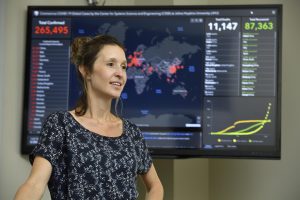
The following was originally published in The Hub.
Lauren Gardner, a professor of civil and systems engineering at Johns Hopkins University’s Whiting School of Engineering, has won the 2022 Lasker-Bloomberg Public Service Award, America’s top biomedical research prize.
Gardner created the COVID-19 dashboard that became the world’s most trusted source for reliable, real-time data about the pandemic. The award was presented today in a virtual ceremony.
“By launching this global COVID-19 surveillance tool, she provided accessible and reliable information about the spread of an emerging infectious disease, thereby filling a void in the international public health system and establishing a model to emulate,” according to the Lasker Foundation. “This trailblazing resource lit a path toward informed policy guidelines and personal choices amidst a morass of misinformation.”
The Lasker-Bloomberg Public Service Award is given biennially to individuals or groups who have improved the public’s understanding of medical research, public health, or health care, or who have benefitted the lives of many through public health practice. Past recipients include Anthony S. Fauci and Bill Gates and Melinda Gates.
“It’s been an exceptional experience to play such an integral role in keeping the world informed during a global public health crisis, and—equally important—changing the expectations around public access to data and information,” said Gardner, an expert in network modeling who specializes in modeling the risk of infectious disease.
Created in January 2020 with doctoral student Ensheng Dong, Gardner’s interactive and easy-to-use COVID-19 tracking map filled a void in the international public health system by tracking cases around the world as they emerged. That data and her team’s expert analysis helped arm policymakers, the medical community, news media and citizens with information to track the pandemic and combat its spread.
Almost three years later, the COVID-19 map—which evolved, with contributions and support from experts across the university, to become the Johns Hopkins Coronavirus Resource Center—continues to be a pre-eminent source of information for pandemic data, mapping not just cases, but deaths, vaccinations and other key trends, such as disparities in the rate of disease spread and health outcomes as related to factors such race, income, and access to private health insurance. The Coronavirus Resource Center has recorded 1.2 billion page views since 2020, with two-thirds of viewers visiting the Global Map. This year the website has continued to garner an average of 6 million page views a month.
In the summer of 2020 Gardner led a study that found that residents in all 25 of the U.S. counties hardest hit by COVID-19 began to limit their public movements before states implemented stay-at-home orders, helping slow the spread of the virus–a finding that strongly supported the value of publicly available data in informing individual level decision-making for mitigating the spread of COVID-19. This knowledge not only helped inform guidelines implemented by local and state governments, but also demonstrated each U.S. resident’s power to help slow the spread of the virus.
The CRC’s tracking efforts also revealed another alarming truth: the lack of data reporting standards across the U.S. that resulted in disjointed reporting by individual states. To address this, the Johns Hopkins Pandemic Data Initiative was launched in 2021 to spotlight systemic deficiencies, examine how those challenges hinder COVID-19 responses, and explore ways to improve the system.
In addition to providing the data to the world, Gardner and her team are avid users of the data. She has projects sponsored by the Centers for Disease Control and Prevention, National Institutes of Health, National Science Foundation, and NASA to develop various data-driven mathematical models to help improve our understanding of COVID-19 transmission and risks.
“I know I speak for everyone at Johns Hopkins when I say how immeasurably proud we are of Dr. Lauren Gardner for receiving the Lasker Award,” JHU President Ron Daniels said. “The COVID-19 dashboard that Dr. Gardner created embodies the core ethos of research universities to advance the common good through reliable knowledge and facts. Thanks to Dr. Gardner’s vision and entrepreneurial spirit, she was able to bring vital information to billions and to help shape public policy at all levels of governance. I look forward with great anticipation to all that Dr. Gardner will continue to achieve in the years ahead.”
In the future, Gardner plans to apply lessons learned from the COVID-19 dashboard to address other issues, including climate change.
“These are human-centric problems with deep-rooted inequities, and often are highly politicized. Central to many of these problems is the harm posed by misinformation, arguably one of the most significant threats facing societies today,” she said. “Addressing these problems demands data-driven solutions and effective science communication. It requires investment and innovation in interdisciplinary sciences, and strong partnerships between researchers and practitioners. I am excited to have the opportunity to work on these problems, with my colleagues and students, to try and make the world a better place.”
The Lasker Foundation called Gardner’s work “visionary.”
“Through her visionary work, Gardner conceived and launched a trailblazing enterprise that has enabled the world to watch, for the first time, a pandemic’s trajectory as it unfolds, and she has bound future health crises to this benchmark,” the Lasker Foundation cited. “She has forged a new expectation for readily accessible information that is timely, detailed, and accurate—and that allows members of society to map their behavior to real health data rather than relying entirely upon the idiosyncrasies of pundits and political leaders.”
Prior to joining Johns Hopkins in 2019, Gardner was a senior lecturer in civil engineering at the University of New South Wales Sydney, in Australia. She holds the Alton and Sandra Cleveland Professorship in the Department of Civil and Systems Engineering at the Whiting School.
She received her BSArchE in architectural engineering, her MSE in civil engineering, and her PhD in transportation engineering at the University of Texas at Austin.